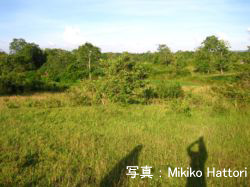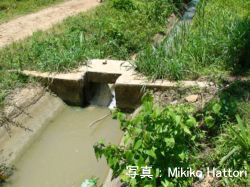Participatory Research on the Impact of the Japanese Funded Bohol Irrigation Phase 1 (Malinao Dam Project) to the Livelihood of Farmer Beneficiaries and to the Environment.
 |
Women's Development Center |
Video:The Hidden Surge Of Malinao Dam(English subtitle) |
 |
Ira Maria Pamat | |
 |
JPY 400,000 |
Research Background Final Report (abstract) Others

no water reaches to converted rice paddies

irrigation canal
Research Background
Malinao Dam or Bohol Irrigation Phase 1 was built in 1995 through a loan fund from Japan ODA (Official Development Assistance) amounting to Php 1.4 billion. During the construction phase, 1,363 farmer landowners entered into a loan agreement with their parcels of land made as collaterals of the loan, to be able to convert their agricultural land into rice paddies. The irrigation staff of the National Irrigation Administration (NIA) as a policy, campaigned for a land leveling and promised that the dam project would "uplift the economic status of the farmer beneficiaries".
The dam project started its operation in 1998 with the target to irrigate 4,960 hectares. Since 2005, after seven years of operation, complaints from the beneficiaries have surfaced that the dam performance is inadequate. Without assessing the Malinao Dam performance, the government of the Philippines incurred another loan from Japan ODA amounting to Php 2.84 billion, to build the Bohol Irrigation Phase 2 (Bayongan Dam Project) using the "surplus" of the water from the Malinao Dam.
The administration of the dam insisted that the irrigation has served its purpose. But the farmers are complaining about it. While the farmers demanded the loan agreement to be cancelled because of the lack of service, the dam administration also pushed that the farmers have no basis for such demand. Therefore, there should be a thorough documentation of the dam's impact as basis of the farmers on their demand for the loan agreement cancellation and to lower the dam rental (irrigation service fee).
The impact of any project should be assessed by the beneficiaries themselves rather than the project implementers. It should not be limited to the direct impact of the project to the people, but its sustainability.
This Participatory Research on the Impact of the Japanese Funded Bohol Irrigation Phase 1 (Malinao Dam Project) to the Livelihood of Farmer Beneficiaries and to the Environment, intends to evaluate the performance of the dam-irrigation project on the point of view of the farmer beneficiaries.
Participatory because we want to actively involve the communities, particularly women and youths who are members of the beneficiary families of the Malinao dam, if the impact of the project trickles down to the families of the beneficiaries, to what extent does the impact goes, and at the same time, they can actively participate in the decision making process on matters affecting their lives, livelihood and future projects the community will get involved to.
The research will touch on the following:
a. Production aspect before and after the dam construction and operation of the Malinao Dam;
b. Processes undertaken before the construction and during the operation of the dam particularly aspects in the decision making in the construction and dam management;
c. Processes undertaken before the dam construction in consideration of the environment; and
d. People's alternative.
The methods to be used will be as informal as to provide venue for the farmer beneficiaries to express openly what the feel deep inside. Different ideas will be gathered and documented, collated and analyzed, and will be validated by the people themselves. The result will be presented back to them so they can draft action plan/s regarding their situation.
As a result, the research will serve as a strong material for advocacy and policy changes.
[January 2009]
Final Report (abstract)
Others
